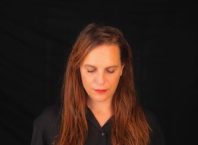![DSC_7183[1]s](http://www.midnighteast.com/mag/wp-content/uploads/2010/03/DSC_71831s.jpg)
In New World Order, guests gather at an elegant party, chatting with their gracious host about an exclusive club, convincing him to join. Noises from outside – shots, sirens, helicopters – are heard intermittently, yet any attempt to consider these is discouraged. A family is brought to the parlor for questioning, which the host performs with chilling competence. The party is a success, the play – enigmatic and thought-provoking.
Pinter’s writing has been associated with “The Theatre of the Absurd,” as referred to by Martin Esslin in his book of the same name. While some of the characteristics of his dramas – a mix of comic scenes with tragic events and images, dialogue detached from a particular time and place, repeated phrases and situations and a disjointed narrative – are similar to writers such as Ionesco and Beckett, many would argue that Pinter’s writing differs in essence. This has led to very different approaches to the staging of Pinter’s work. When characters interact in an unnamed location and place, one might make two different premises – either there is no referent, or there is a referent that is unnamed – resulting in vastly different interpretations of the work.
Pinter wrote in 1962 (from The Guardian): “I have usually begun a play in quite a simple manner; found a couple of characters in a particular context, thrown them together and listened to what they said, keeping my nose to the ground. The context has always been, for me, concrete and particular, and the characters concrete also… Language, under these conditions, is a highly ambiguous business. So often, below the word spoken, is the thing known and unspoken. My characters tell me so much and no more, with reference to their experience, their aspirations, their motives, their history. Between my lack of biographical data about them and the ambiguity of what they say lies a territory which is not only worthy of exploration, but which it is compulsory to explore. You and I, the characters which grow on a page, most of the time we’re inexpressive, giving little away, unreliable, elusive, obstructive, unwilling. But it’s out of these attributes that a language arises. A language, I repeat, where under what is said, another thing is being said.”
A powerful writer whose work evades simple classification, Pinter is a writer whose work presents a challenge to directors, translators, actors and audiences. The minimalist language, deceptive in its apparent simplicity, poetic in its reverberating layers of association, creates a text that resonates with emotion. The play is performed by Khan ensemble actors: Yossi Eini, Liron Baraness, Carmit Mesilati-Kaplan, Shimrit Lustig, Nili Rogel, Vitali Friedland, and Yoav Hyman. Stage and costume design by Polina Adamov, musical editing by Dori Parnes and Lighting design by Roni Cohen.
Midnight East concurs with Pinter: “a territory not only worthy of exploration, but which it is compulsory to explore.”
New World Order is currently playing at the Khan Theatre, 2 David Remez Square, Jerusalem. Tickets and information: 02- 6718281
AYELET DEKEL






[…] theatre rivets us to our seats, but perhaps it can and should also make us want to bolt. Watching New World Order, three short plays by Harold Pinter (1930 – 2008), translated into Hebrew by Avraham Oz, adapted […]
Comments are closed.